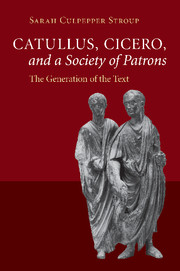Book contents
- Frontmatter
- Contents
- Preface and acknowledgments
- List of abbreviations
- Introduction
- I HOW TO WRITE ABOUT WRITING
- II THE TEXTUALIZATION OF DISPLAY
- III THE MATERIALIZATION OF THE TEXT
- Epilogue
- Appendix: What “Society of Patrons”? A prosopography of the players
- Bibliography
- Index locorum
- Index rerum et nominum
Appendix: What “Society of Patrons”? A prosopography of the players
Published online by Cambridge University Press: 04 August 2010
- Frontmatter
- Contents
- Preface and acknowledgments
- List of abbreviations
- Introduction
- I HOW TO WRITE ABOUT WRITING
- II THE TEXTUALIZATION OF DISPLAY
- III THE MATERIALIZATION OF THE TEXT
- Epilogue
- Appendix: What “Society of Patrons”? A prosopography of the players
- Bibliography
- Index locorum
- Index rerum et nominum
Summary
Although the focus of this study lies almost entirely on the dedicated and “dedication-minded” texts of Catullus and Cicero, it will be good to say a word about the scope of the broader Society in which these exchanges were taking place. In what follows I provide a brief survey of those individuals – first the “probable,” then the “possible,” and finally two likely influential forerunners – whom we might identify as participants in this Society, as suggested by our textual evidence from the Republic (this is especially the case for the “probable” participants) and that which would come later.
To attempt a concrete reconstruction of a textual Society that was by all evidence a highly plastic one – shaped and reshaped by artistic, social, and intellectual debates, inside jokes and real enmity, newly formed alliances and stiff competition (and thus not too foreign to the world of academia) – would be both artificial and misleading, and so is not my goal. The survey that follows is certainly not exhaustive, nor does it claim excessive detail in either its prosopography or bibliography. While many of the individuals included below are well-known figures from the Republic, little or nothing survives of their dedicated work, and our knowledge of titles and subject matter is often rather tenuous (the latter usually derived from the former).
- Type
- Chapter
- Information
- Catullus, Cicero, and a Society of PatronsThe Generation of the Text, pp. 274 - 290Publisher: Cambridge University PressPrint publication year: 2010



